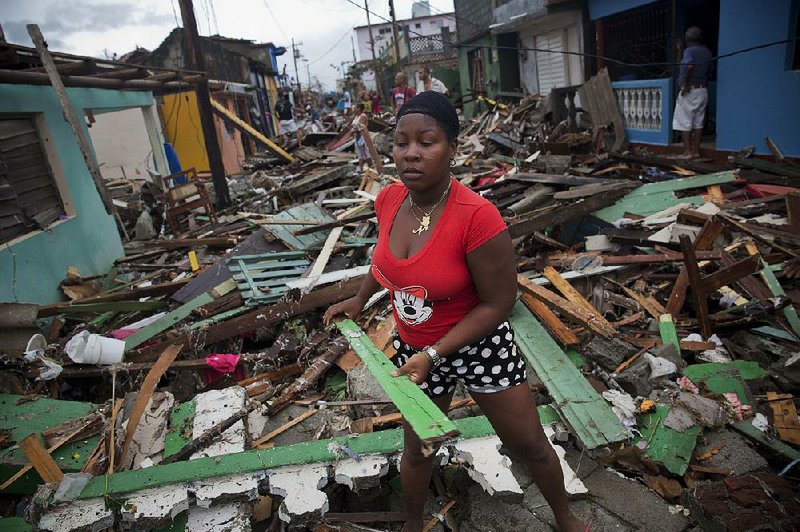PORT-AU-PRINCE, Haiti -- Hurricane Matthew left a path of destruction in Haiti, where rescue workers struggled Wednesday to reach cutoff towns and learn the full extent of the death and damage. Matthew was blamed for at least 16 deaths there and in the Dominican Republic, and hospitals and shelters were said to be brimming.
In the U.S., authorities in southeastern coastal states prepared for Matthew's strong winds and heavy rain, expected to hit late today. They declared emergencies, ordered evacuations and shuttered schools.
The storm weakened Wednesday as it passed over a corner of Cuba but was expected to regain strength as it heads for the U.S. It is forecast to move across the Bahamas today on a course expected to take it near the capital city, Nassau, and is "expected to be very near the east coast of Florida" by this evening, the National Hurricane Center said Wednesday.
Matthew swept Tuesday across a remote area of Haiti, producing 145 mph winds, wrecking homes and swamping roads. Government leaders in the poorest country in the Western Hemisphere said they weren't close Wednesday to fully gauging the effect in the flood-prone nation where less powerful storms have killed thousands.
[HURRICANE TRACKER: Follow Hurricane Matthew’s path so far, projected course]
"What we know is that many, many houses have been damaged. Some lost rooftops, and they'll have to be replaced, while others were totally destroyed," Interior Minister Francois Anick Joseph said.
John Hasse, national director of the aid group World Vision in Haiti, estimated "thousands of houses destroyed or damaged" in the areas hardest hit. The Haitian government said at least 350,000 people were in immediate need of help around the country, the United Nations noted.
Mourad Wahba, the U.N. secretary-general's deputy special representative for Haiti, said at least 10,000 people were in shelters, and hospitals were crammed to overflowing.
He called the hurricane the biggest humanitarian crisis in Haiti since the earthquake of 2010.
Samuel Darguin, a worker with the aid group Haitian American Caucus-Haiti, said relief convoys were prevented from reaching many areas because of bridges swept away by floodwaters.
Aid groups with representatives in the area said it was clear that many homes and crops were destroyed, but the extent was impossible to gauge, especially in the Grand Anse area on the southern tip, which took a direct hit from the storm.
"We have people in Grand Anse that we cannot reach," said Hervil Cherubin, country director for Heifer International, the Little Rock-based nonprofit. Heifer Haiti works with more than 6,500 families in the region hit by the storm.
"Loss of crops, livestock and housing will cause a real disaster in the coming months," Cherubin said in a statement. "People will not have food to eat or the ability to create income as there are no crops to sell. This will create a huge problem in rural Haiti if something is not done to help the agriculture in the next three months."
International aid was underway with a focus on shelter and clean water. The U.S. Navy has sent three ships, including an aircraft carrier and a hospital ship, to Haiti. About 300 Marines were aboard the USS Mesa Verde, an amphibious transport vessel.
The United States announced $1.5 million in aid available to the Caribbean countries in Matthew's wake. Disaster response teams were pre-positioned with some supplies and were assessing the damage and urgent relief needs, said Kenneth Merten, the deputy assistant secretary for the Western Hemisphere and special coordinator on Haiti.
Beyond food, the aid includes blankets, shelter, and kits for hygiene and water purification to help prevent the spread of cholera, said David Harden, an official with USAID.
Venezuela mobilized an airlift of humanitarian supplies, and the British-based group Oxfam concentrated on sanitation and clean-water efforts.
Meanwhile, the Haitian government postponed Sunday's presidential election, in part because many of the schools and churches that are used as polling stations are now serving as shelters. A new date for the vote was not announced.
While the capital, Port-au-Prince, was essentially back to normal, there was widespread flooding across southern Haiti.
"There's absolutely nothing we can do to protect ourselves here," said motorcycle taxi driver Joseph Paul as he watched torrents of brown water wash over a road and deluge his low-lying neighborhood in Leogane. "This storm was too much for us, and we are at its mercy."
The U.S. government said it also has sent experts to Haiti to help assess the damage.
Before dawn Wednesday, the hurricane blew across the sparsely populated tip of Cuba, destroying dozens of homes in Cuba's easternmost city, Baracoa, and damaging hundreds of others.
People stood in the rubble of their homes, weeping, hugging or staring stunned into the distance. Others searched piles of concrete and rebar for any possessions they could salvage. Some carried cooking pots and rolled-up mattresses through the streets on their way to shelters.
"I've never seen something like this in my life," said Elva Perez, a 55-year-old homemaker, as she stood by what remained of her home. "For more than 200 years, here in this house, nothing like this has ever happened."
At the U.S. naval base at Guantanamo Bay, Cuba, the storm knocked down trees and caused road flooding but no injuries or major damage, said Julie Ripley, a spokesman.
As of 10 p.m. Central time Wednesday, Matthew was centered about 125 miles south-southeast of Nassau in the central Bahamas. It was heading northwest at 10 mph.
Preparations in U.S.
From Florida to the Carolinas, officials urged people to take the storm seriously. They warned of the storm's extreme danger, which forecasters say could include "life-threatening" flooding along Florida's eastern coast.
"If Matthew directly impacts Florida, there will be massive destruction that we haven't seen in years," Gov. Rick Scott, a Republican, said during a news conference. "If you're able to go early, leave now."
Scott has declared a state of emergency in Florida, as have the governors in Georgia, South Carolina and North Carolina. By Wednesday, Scott said he expected to have 500 members of the Florida National Guard activated and another 6,000 ready to be deployed as needed.
"This is a serious storm," President Barack Obama said after he was briefed on hurricane preparations at the Federal Emergency Management Agency headquarters in Washington. He added: "You can always rebuild, you can always repair property. You cannot restore a life if it is lost."
Obama had been scheduled to visit Florida for two events Wednesday, but he scrapped the trip because of the storm and went to FEMA for the briefing instead, according to the White House. He warned that the storm "could have a devastating effect" even in areas spared the full force of the hurricane, and urged residents to pay attention to local leaders and follow evacuation orders.
Late Wednesday morning, the National Hurricane Center said it was extending hurricane warnings along much of Florida's eastern coast. By 11 a.m., the storm was moving northwest with maximum sustained winds near 120 mph and higher gusts, the center said. Matthew is expected to remain a Category 3 storm "or stronger" as it moves through the Bahamas and toward Florida.
"Regardless if there's a direct hit or not, the impacts will be devastating," Scott said during another briefing on Florida's preparations. "I cannot emphasize it enough that everyone in our state must prepare now for a direct hit."
Scott said some mandatory evacuations were in place Wednesday along with voluntary evacuations in Lucie, Flagler and Duval counties, home to more than 1.2 million people. He also said he expected more evacuation plans to follow later in the day and urged people to start planning where they will go.
Forecasts have shifted Matthew's track closer and closer to Florida's coast, and is expected to hit late today and into Friday. If Matthew does hit that area as a Category 3 or stronger hurricane, it would end the nation's decade-long streak of being spared such a powerful storm hitting landfall, according to the Capital Weather Gang.
In South Carolina, Republican Gov. Nikki Haley activated the state's National Guard and said the state would evacuate all coastal communities Wednesday and close all coastal schools. More than 1 million people in South Carolina are expected to be under evacuation orders, and by Wednesday morning, roads were already jammed with people trying to leave.
In Georgia, Gov. Nathan Deal signed an executive order declaring an emergency for a week in 13 of the state's coastal counties, noting that the storm could cause "extensive flooding, fallen trees and the closure of numerous roads," essentially rendering much of the region impassable.
"The safety of Georgians is our first priority, and we urge residents in these areas to remain calm but vigilant as they prepare for potential impact," the Republican said in a statement.
A North Carolina emergency declaration covered 66 counties in parts of state's eastern and central areas. Republican Gov. Pat McCrory said that includes areas that have just recently seen substantial flooding and remain saturated. Two weeks ago, McCrory declared an emergency in counties flooded by the remains of Tropical Storm Julia.
Information for this article was contributed by Mark Berman, Jason Samenow, Angela Fritz, Christian Davenport, Paul Schemm, Brian Murphy, Carol Morello, William Branigin and David Filipov of The Washington Post; and by David Mcfadden, Ben Fox, Evens Sanon, Ramon Espinosa and Joshua Replogle of The Associated Press.
A Section on 10/06/2016


